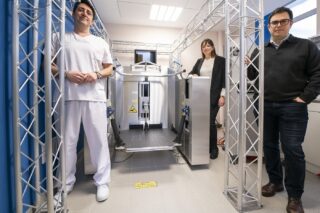A new test that can predict who is at risk of developing type 1 diabetes will revolutionize the treatment of the disease, according to scientists.
A biochip from the global firm Randox based on unique scientific research is the first to use genetic data to swiftly identify which patients may get type 1 diabetes. Recent drug innovation means there are now treatments that can delay the onset of type 1 diabetes, but only if given before the stage where an official diagnosis can be made.
The fingernail-size biochip uses a small sample of blood to determine which patients should be sent for further testing to accelerate their access to these exciting new treatments. The Radox device uses a genetic risk score developed by Professor Richard Oram at the University of Exeter, in the UK.
Type 1 diabetes has a significant inherited risk and there are multiple different genetic variants that contribute to type 1 diabetes. Prof Oram has spent a decade developing what he calls a “recipe” that adds up the individual components of the risk factor to create an individual’s risk score.

The new device can simultaneously identify up to 10 of these genetic variants which are then analyzed using Prof Oram’s scale to determine whether someone needs further testing for treatment. Previously, technology didn’t exist to enable a global screening program for efficient and early treatment for type 1 diabetes. The test, which has received UK regulatory approval and is now available to buy, will also help determine type 1 from type 2 diabetes, further improving clinical decision-making and treatment.
Prof Oram told MedicalExpo e-magazine:
“There’s been a revolution in treatment for people with type 1 diabetes. We now have immunotherapy that can treat it before it develops, so our research matters now more than ever. The biochip will help improve precision treatment before any symptoms of type 1 diabetes present.”
Understanding a Person’s Background Genetic Risk
The product is now available to buy on the UK high street and through Randox Health clinics. It can also be ordered online for sample collection at home and returned to Randox’s laboratories for testing.
Professor Oram added:
“The world is waking up to the value of screening programs for type 1 diabetes because of new drugs which must be given at the earliest stages of disease.
Our new biochip is a pioneering example of how understanding a person’s background genetic risk can help identify those at highest risk, ensuring they have further antibody screening so we can efficiently identify type 1 diabetes early enough for treatment to be effective.
It could aid in speeding up decisions around who should be monitored and tested further, making public health screening cost effective and improving lives by increasing access to treatment.”
More than eight million people worldwide have type 1 diabetes, which causes the immune system to attack the beta cells that regulate blood sugar. Despite the disease being primarily caused by genetics, only 1 in 10 people with it have a family member with the disease, meaning efficient screening is vital to determine the other 90 percent.

Dr Lucy Chambers, Head of Research Communications at Diabetes UK, said:
“New treatments to prevent or delay type 1 are on the horizon and their success hinges on establishing effective screening methods to pinpoint those at higher risk.”
Dr Peter FitzGerald, MD of Randox, said:
“This test is a game-changer in the diagnosis and treatment of type 1 diabetes and we look forward to deploying the test to support public and private healthcare providers globally.”










